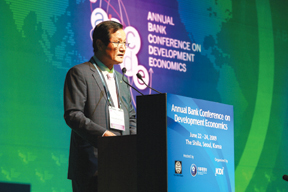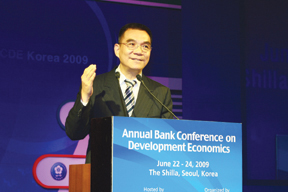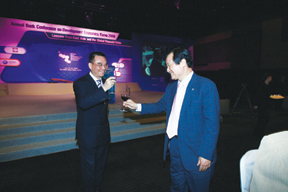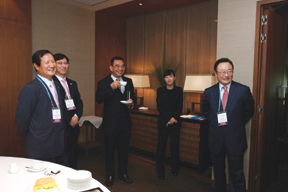Korea to Lend Hand to Developing Nations
ABCDE Confab in Seoul co-hosted by MOSF and World Bank takes up various global economic development issues


This year's 20th Annual Bank Conference on Development Economics held in Seoul from June 22-24 concluded its sessions on a successful note, drawing 1,284 participants including 158 from abroad, the Ministry of Strategy and Finance (MOSF) which co-hosted the global meeting with the World Bank said recently.
Dignitaries at the meeting held at the Shilla Hotel included Minister Yoon Jeung-hyun; Justin Lin, senior vice president and chief economist at the World Bank; Dr. Sakong Il, chair of the G-20 Korea Coordinating Committee and concurrently chairman of the Korea International Trade Association; Chairman Euh Eun-dae of the Korean Brand Committee; Dr. Ann Krueger of Johns Hopkins University; Dr. Simon Johnson of the Massachusetts Institute of Technology; and other professors, academics, leaders in finance, business and economic research institutes.

Minister Yoon, in his opening speech as a co-host of the international gathering, said what is needed at the moment is a rapid global policy cooperation regime to cope effectively with the economic crisis sweeping the world. Positive signs that the worst of the crisis is over have been emerging due to the G-20 Summit Agreement and other international cooperation efforts, the minister said. But uncertainty is still there and the G-20 Group should continue to play its central role to stymie the crisis through continued global macroeconomic-policy coordination.
Minister Yoon went on to say that a new growth engine should be secured for sustainable world economic growth and to fight climate warming through a Green Growth Deal.
The minister recommended a more balanced world economy through the expansion of freer trade and investment and pursue joint growth.
Korea is ready to play the role of a bridge between advanced and developing countries with its development experience and with its economy closely approaching the levels of advanced countries.
Minister Yoon also pledged that Korea, as the 10th largest economy in the world, will do its duty as a global economic partner to share its economic development experiences with underdeveloped countries. He said Korea will expand its knowledge sharing program to help the economic growth of developing countries and also increase ODA for its positive support in solving underdevelopment, climate change and other joint global problems.
"As Korea is the chair country for the G-20 Summit scheduled for next year, we will try to have the meeting solidify its position as a center of international coordination"said Minister Yoon.
Yoon said the ABCDE conference would be able to seek out ways to solve the economic crisis and be able to find some means for the world to sustain its economic growth.
World Bank's Lin, as a co-host of the global conference, said in his opening remarks that the current economic crisis is the most serious one since the Great Depression of the 1920s.
There have been recent signs that the global downturn might be bottoming out: a recovery of stock markets, a decline in interest rate spreads, improved business and consumer confidence and in some industrialized economies, levels of unsold stock are beginning to subside.
He said it is probably too early to know if some of these positive signs simply reflect the mechanical effect of the expansionary monetary policies adopted by almost all central banks and the fiscal stimulus packages being implemented around the world.
This year's conference theme was Lessons from East Asia and the Global Financial Crisis.
Beyond the painful cruelty of the crisis (loss of wealth, unemployment and its social and political consequences), economists should welcome the fact that the crisis is likely to spark an evolution in thinking about economic development ! its nature, its causes, and the choice of policies it requires, Lin said.
"Despite the unpleasant criticism and the sometimes unfair challenges to our discipline, economists must acknowledge some mistakes ! such as the naive belief in the end of volatility, and the implication of complacency ! and gaps in the existing stock knowledge, and use the current crisis as an opportunity for new thinking on macro and development issues," Lin said.
Lin said in the current crisis, the following questions are even more relevant:
* Under what conditions are the traditional broad principles of good macroeconomic management (free markets and sound money) conducive to sustained growth and poverty reduction?
* Even if these broad principles still apply to all countries in an increasingly globalized world, how show they be made operational, especially from the perspective of developing countries?
* What new principles of economic policy can be learned from the experience of East Asian and Latin American countries that seem to have weathered the storm?
* Given that sustained growth is mostly about continuous industrial and technological upgrading, how should industrial policies be designed and implemented?
* How should the 'comparative advantage theory'be integrated into development economics?
* What institutions really matter for growth, especially from the perspective of developing countries? What have we learned about the virtuous circle between institutions, social capital and economic development?
"Clearly, we will not be able to settle these questions ! and many others on the agenda ! over the next two days. Still, given the impressive collection of great minds attending this meeting, I am confident that we will make serious progress, and perhaps, enrich development thinking,"Lin said.
In the meantime, the World Bank's summary of the event said, "For two-and-a-half days (June 22-24) the participants in the ABCDE Conference engaged in a series of very high-quality discussions and debates on the most pressing economic and development policy issues of our times. The World Bank's Development Economics group is grateful to Korea's Ministry of Strategy and Finance and the Korea Development Institute for their generous hosting of this annual international conference on development policy and research."As outlined at the start of the conference by MOSF Minister Yoon, the World Bank's Lin and Sakong Il, the world faces great development challenges. In the short-term, policy makers worldwide and the IFIs have focused their attention on the financial and global economic crisis. It has already led to important institutional innovations, such as the rise of the G20 as perhaps the premier economic grouping, huge debate on the strengthening of existing global institutions and perhaps on the need for new ones, and thinking on effective fiscal stimulus, including the opportunities from a "green" stimulus. World leaders need to increase their understanding of the causes of the crisis, its impacts, how to exit the crisis and how financial regulation needs to change to reduce the risk of recurrence.
In the 1960s, Korea was at the level of income of many African economies, and was often considered a hopeless case. However, it evolved a coherent and cohesive development policy, and incomes rose more than tenfold in about 40 years. Korea exploited the opportunities afforded by globalization; exports were 3 percent of GDP in 1960, but reached 38 percent by 1980. Africa differs from Korea in a number of respects, but there are many lessons, including the importance of nurturing small firms to provide a basis for growth, and reducing the levels of inefficiencies in the business climate.
Even if global growth may be slowed as households adjust demand to reconstitute their balance sheets after huge losses, the post-crisis world economy will still provide opportunities. Indeed, because capital is likely to be more costly for an extended period, there is a special premium on the effective use of labor, and an opportunity for well-managed labor-abundant countries, including in Africa. But it is vital to secure free trade, and developing countries, which have much to gain, should be more vocal in advocacy. nw
Minister Yoon Jeung-hyun of the Ministry of Strategy and Finance delivers his opening speech at the ABCDE Conference in Seoul June 22-24 jointly sponsored by the MOSF and the World Bank. Photo on courtesy of the Ministry of Strategy and Finance.
Dr. Justin Lin, vice president and senior economist at the World Bank, who also delivers his speech at the international conference.
Minister Yoon and Dr. Justin Lin greet each other at an official dinner during the ABCDE Conference in Seoul.
Dignitaries, including Minister Yoon and Dr. Justin Lin and KITA Chairman Sakong Il, chat at the ABCDE Conference in Seoul.
3Fl, 292-47, Shindang 6-dong, Chung-gu, Seoul, Korea 100-456
Tel : 82-2-2235-6114 / Fax : 82-2-2235-0799